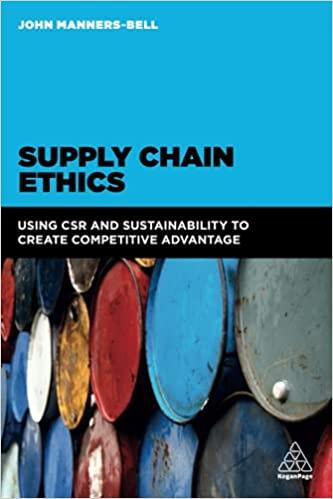Answered step by step
Verified Expert Solution
Question
1 Approved Answer
(1) Task 1 (Case Summary) (10%): Summarise the case using the format provided in Microsoft Word; Length of the case summary: NOT EXCEEDING 2 PAGES

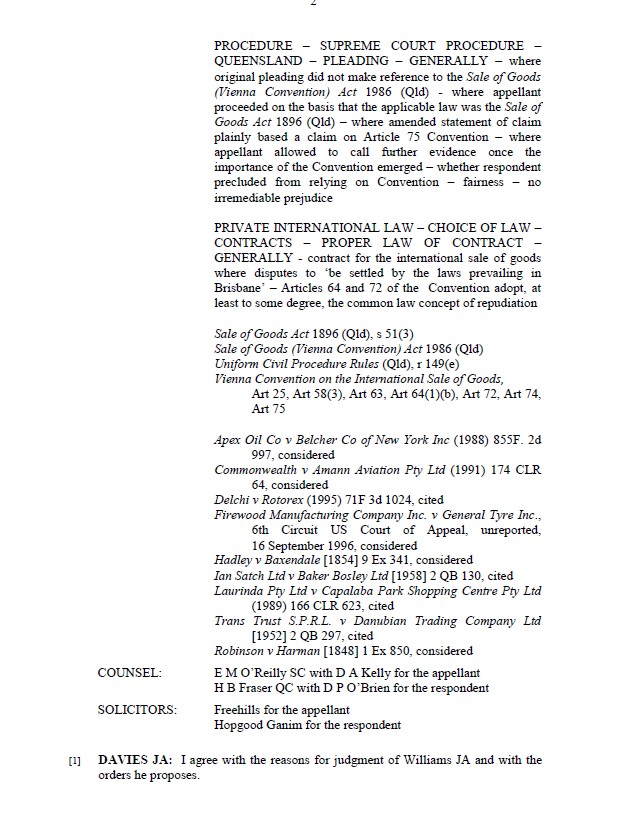
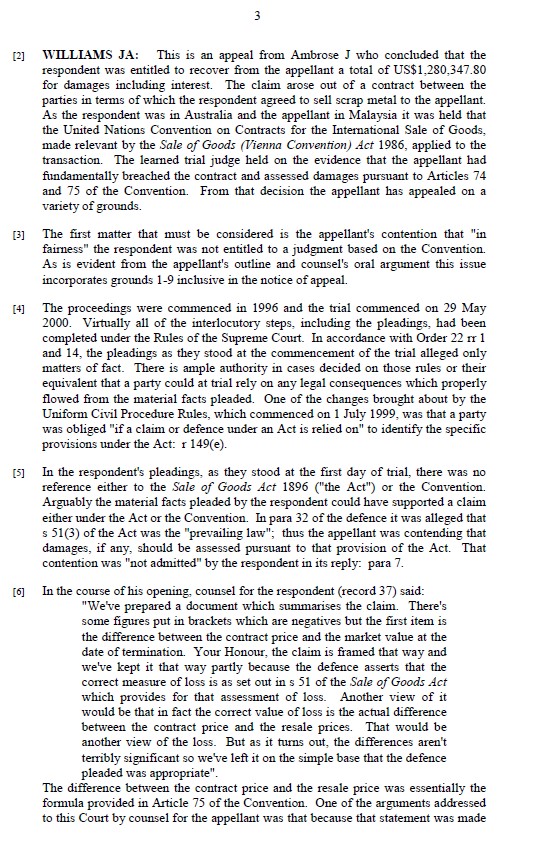
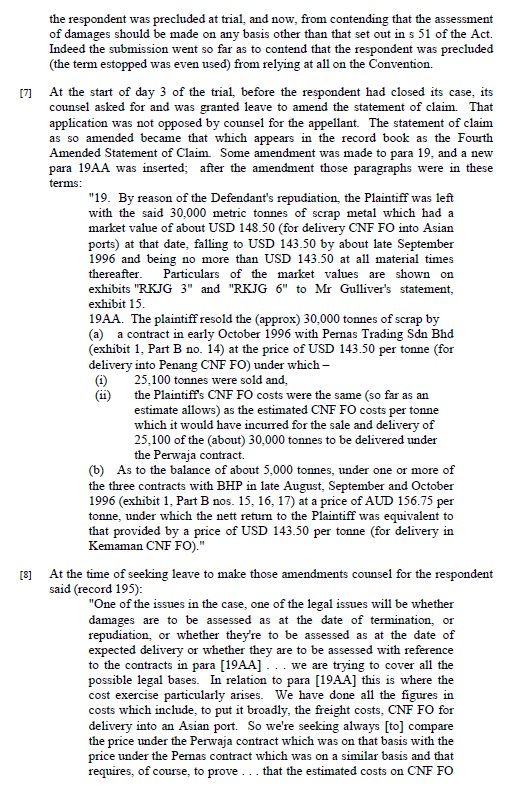
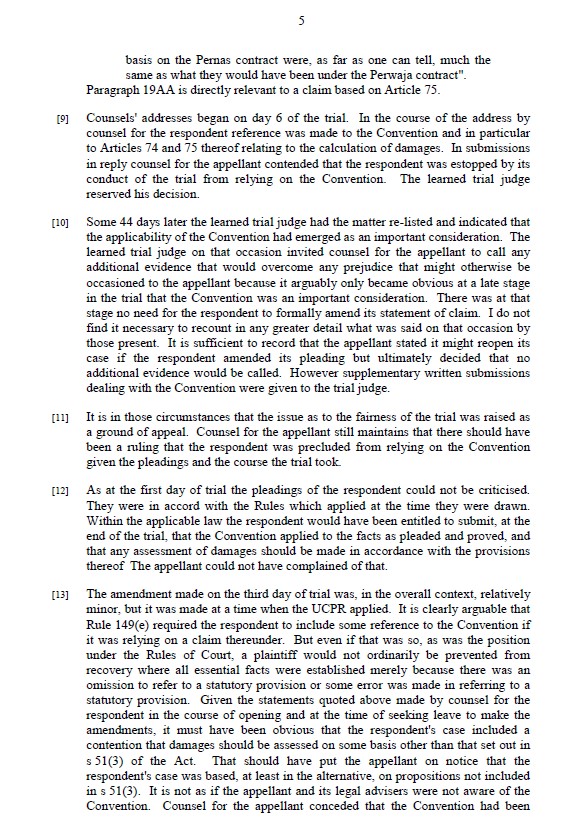
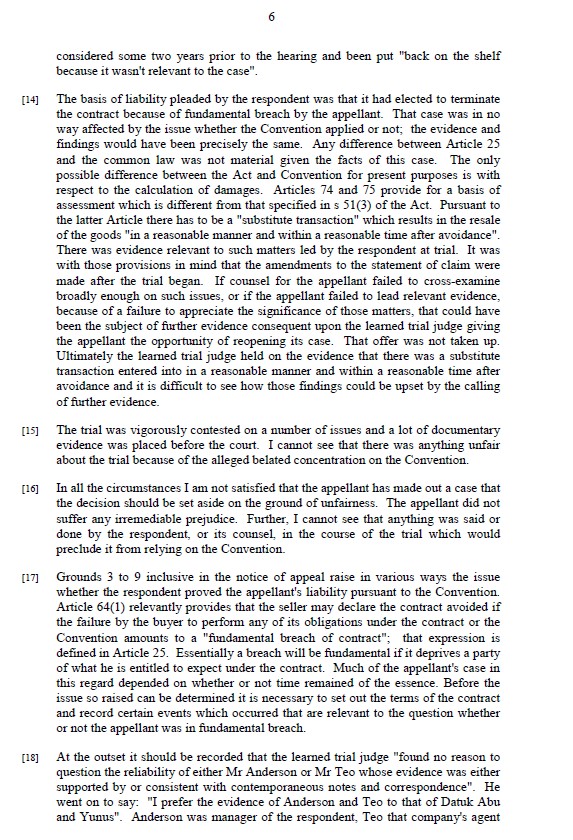
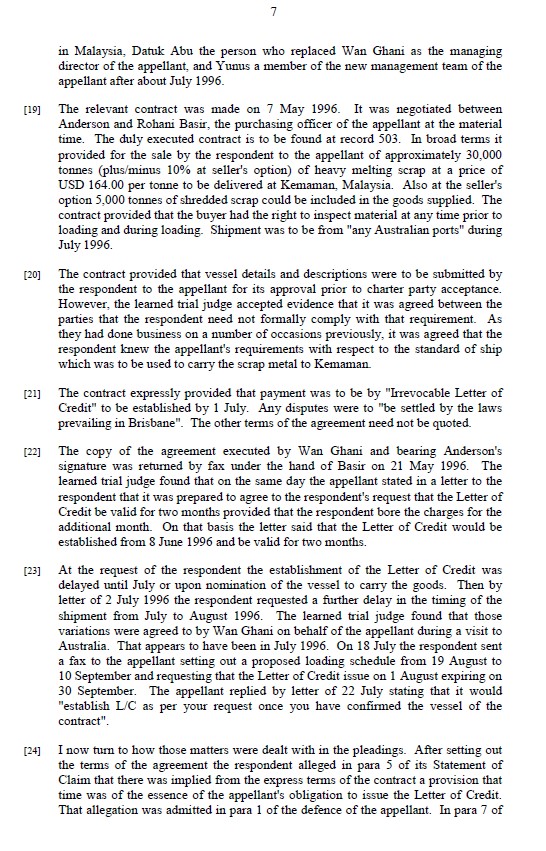
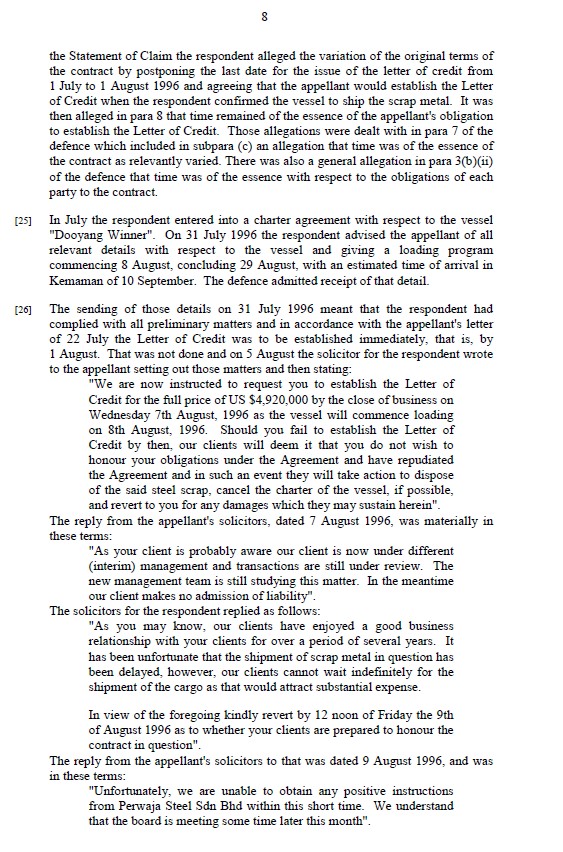
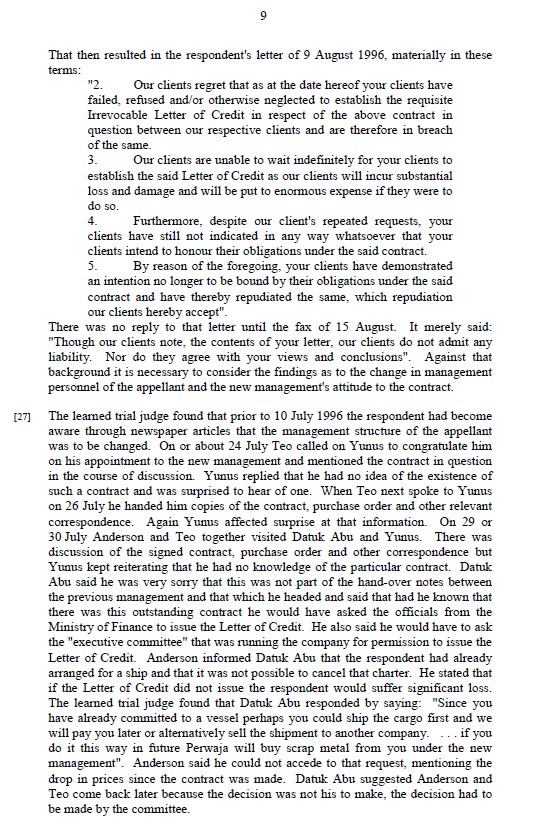
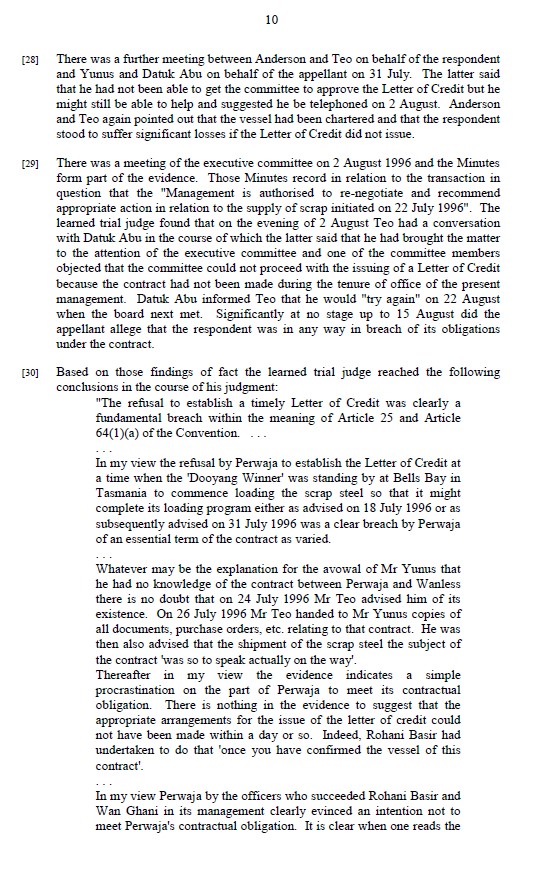
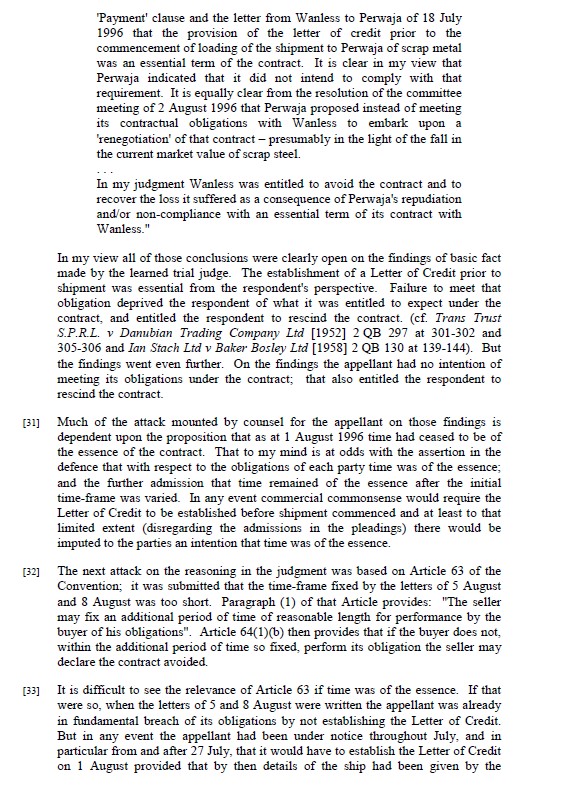
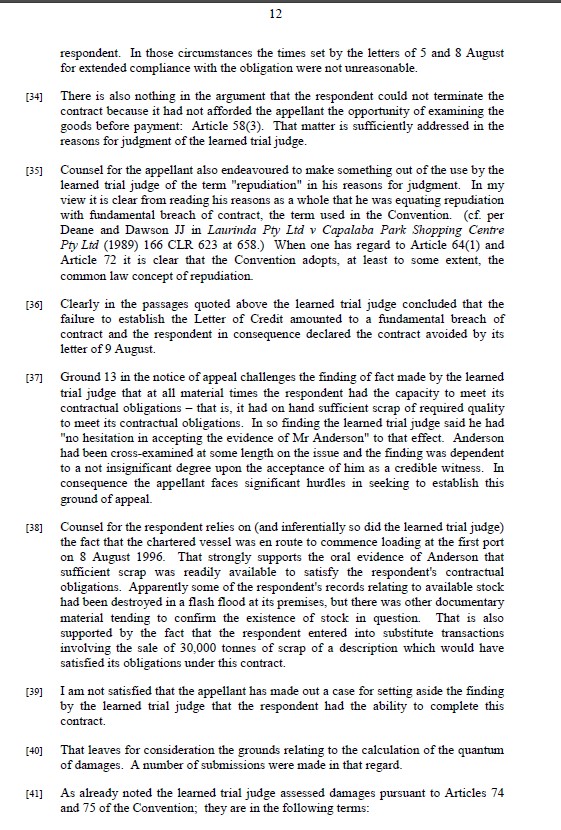
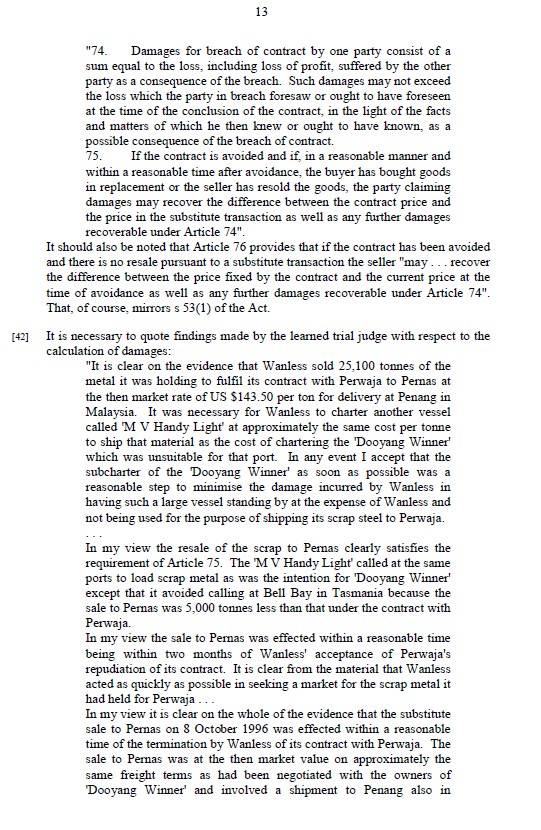
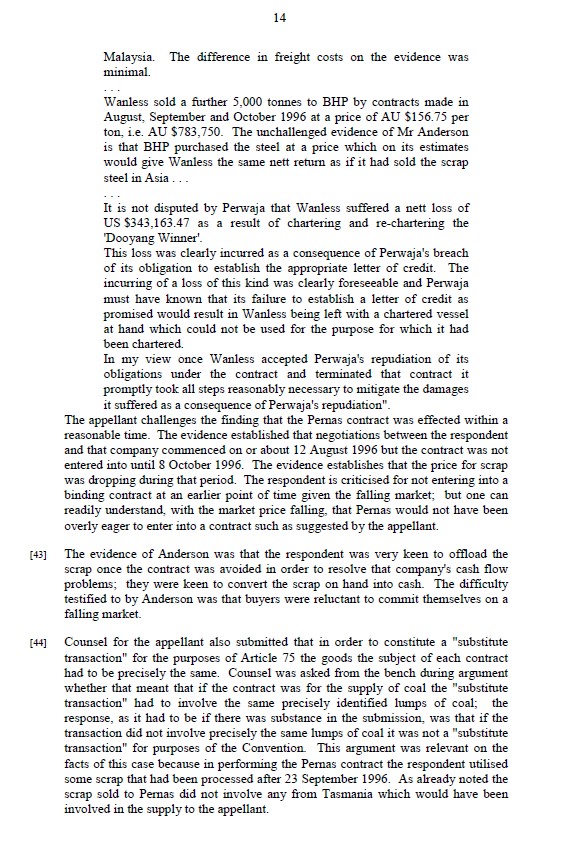
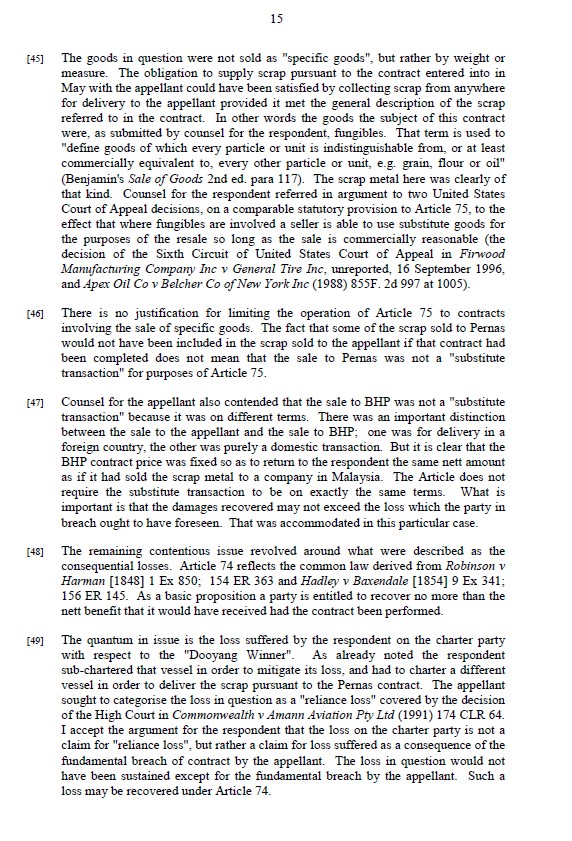
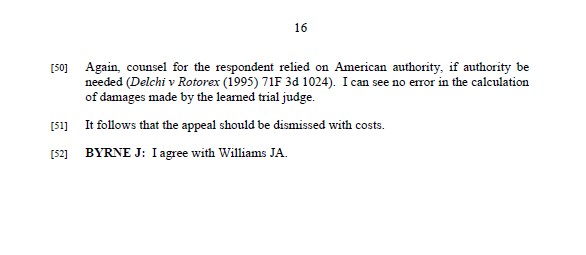
(1) Task 1 (Case Summary) (10%): Summarise the case using the format provided in Microsoft Word; Length of the case summary: NOT EXCEEDING 2 PAGES References: Reference your sources of information that correspond to the citations used in your summary.
SUPREME COURT OF OUEENSLAND PROCEDURE - SUPREME COURT PROCEDURE QUEENSLAND - PLEADING - GENERALLY - where original pleading did not make reference to the Sale of Goods (Vienna Convention) Act 1986 (Q1d) - where appellant proceeded on the basis that the applicable law was the Sale of Goods Act 1896 (Q1d) - where amended statement of claim plainly based a claim on Article 75 Convention - where appellant allowed to call further evidence once the importance of the Convention emerged - whether respondent precluded from relying on Convention - faimess - no irremediable prejudice PRIVATE INTERNATIONAL LAW - CHOICE OF LAW CONTRACTS - PROPER LAW OF CONTRACT GENERALLY - contract for the international sale of goods where disputes to 'be settled by the laws prevailing in Brisbane' - Articles 64 and 72 of the Convention adopt, at least to some degree, the common law concept of repudiation Sale of Goods Act 1896 (Q1d), s 51(3) Sale of Goods (Vienna Convention) Act 1986 (Q1d) Uniform Civil Procedure Rules (Qld), r 149(e) Vienna Convention on the International Sale of Goods, Art 25, Art 58(3), Art 63, Art 64(1)(b), Art 72, Art 74, Art 75 Apex Oil Co v Belcher Co of New York Inc (1988) 855F. 2d 997 , considered Commonwealth v Amann Aviation Pty Ltd (1991) 174 CLR 64, considered Delchi v Rotorex (1995) 71F 3d 1024, cited Firewood Manufacturing Company Inc. v General Tyre Inc., 6th Circuit US Court of Appeal, unreported, 16 September 1996 , considered Hadley v Baxendale [1854] 9 Ex 341, considered Ian Satch Ltd v Baker Bosley Ltd [1958] 2 QB 130, cited Laurinda Pty Ltd v Capalaba Park Shopping Centre Pty Ltd (1989) 166 CLR 623, cited Trans Trust S.P.R.L. v Danubian Trading Company Ltd [1952] 2 QB 297, cited Robinson v Harman [1848] 1 Ex 850, considered COUNSEL: SOLICITORS: E M O'Reilly SC with D A Kelly for the appellant H B Fraser QC with D P O'Brien for the respondent Freehills for the appellant Hopgood Ganim for the respondent DAVIES JA: I agree with the reasons for judgment of Williams JA and with the orders he proposes. 3 [2] WILLIAMS JA: This is an appeal from Ambrose J who concluded that the respondent was entitled to recover from the appellant a total of US $1,280,347.80 for damages including interest. The claim arose out of a contract between the parties in terms of which the respondent agreed to sell scrap metal to the appellant. As the respondent was in Australia and the appellant in Malaysia it was held that the United Nations Convention on Contracts for the International Sale of Goods, made relevant by the Sale of Goods (Vienna Convention) Act 1986, applied to the transaction. The learned trial judge held on the evidence that the appellant had fundamentally breached the contract and assessed damages pursuant to Articles 74 and 75 of the Convention. From that decision the appellant has appealed on a variety of grounds. [3] The first matter that must be considered is the appellant's contention that "in fairness" the respondent was not entitled to a judgment based on the Convention. As is evident from the appellant's outline and counsel's oral argument this issue incorporates grounds 1-9 inclusive in the notice of appeal. [4] The proceedings were commenced in 1996 and the trial commenced on 29 May 2000. Virtually all of the interlocutory steps, including the pleadings, had been completed under the Rules of the Supreme Court. In accordance with Order 22rr1 and 14 , the pleadings as they stood at the commencement of the trial alleged only matters of fact. There is ample authority in cases decided on those rules or their equivalent that a party could at trial rely on any legal consequences which properly flowed from the material facts pleaded. One of the changes brought about by the Uniform Civil Procedure Rules, which commenced on 1 July 1999, was that a party was obliged "if a claim or defence under an Act is relied on" to identify the specific provisions under the Act: r149(e). [5] In the respondent's pleadings, as they stood at the first day of trial, there was no reference either to the Sale of Goods Act 1896 ("the Act") or the Convention. Arguably the material facts pleaded by the respondent could have supported a claim either under the Act or the Convention. In para 32 of the defence it was alleged that s 51(3) of the Act was the "prevailing law"; thus the appellant was contending that damages, if any, should be assessed pursuant to that provision of the Act. That contention was "not admitted" by the respondent in its reply: para 7. [6] In the course of his opening, counsel for the respondent (record 37) said: "We've prepared a document which summarises the claim. There's some figures put in brackets which are negatives but the first item is the difference between the contract price and the market value at the date of termination. Your Honour, the claim is framed that way and we've kept it that way partly because the defence asserts that the correct measure of loss is as set out in s 51 of the Sale of Goods Act which provides for that assessment of loss. Another view of it would be that in fact the correct value of loss is the actual difference between the contract price and the resale prices. That would be another view of the loss. But as it turns out, the differences aren't terribly significant so we've left it on the simple base that the defence pleaded was appropriate". The difference between the contract price and the resale price was essentially the formula provided in Article 75 of the Convention. One of the arguments addressed to this Court by counsel for the appellant was that because that statement was made the respondent was precluded at trial, and now, from contending that the assessment of damages should be made on any basis other than that set out in s51 of the Act. Indeed the submission went so far as to contend that the respondent was precluded (the term estopped was even used) from relying at all on the Convention. [7] At the start of day 3 of the trial, before the respondent had closed its case, its counsel asked for and was granted leave to amend the statement of claim. That application was not opposed by counsel for the appellant. The statement of claim as so amended became that which appears in the record book as the Fourth Amended Statement of Claim. Some amendment was made to para 19 , and a new para 19AA was inserted; after the amendment those paragraphs were in these terms: "19. By reason of the Defendant's repudiation, the Plaintiff was left with the said 30,000 metric tonnes of scrap metal which had a market value of about USD 148.50 (for delivery CNF FO into Asian ports) at that date, falling to USD 143.50 by about late September 1996 and being no more than USD 143.50 at all material times thereafter. Particulars of the market values are shown on exhibits "RKJG 3" and "RKJG 6n to Mr Gulliver's statement, exhibit 15. 19A.A. The plaintiff resold the (approx) 30,000 tonnes of scrap by (a) a contract in early October 1996 with Pernas Trading Sdn Bhd (exhibit 1, Part B no. 14) at the price of USD 143.50 per tonne (for delivery into Penang CNFFO ) under which - (i) 25,100 tonnes were sold and, (ii) the Plaintiff's CNF FO costs were the same (so far as an estimate allows) as the estimated CNF FO costs per tonne which it would have incurred for the sale and delivery of 25,100 of the (about) 30,000 tonnes to be delivered under the Perwaja contract. (b) As to the balance of about 5,000 tonnes, under one or more of the three contracts with BHP in late August, September and October 1996 (exhibit 1, Part B nos. 15, 16, 17) at a price of AUD 156.75 per tonne, under which the nett return to the Plaintiff was equivalent to that provided by a price of USD 143.50 per tonne (for delivery in Kemaman CNF FO)." [8] At the time of seeking leave to make those amendments counsel for the respondent said (record 195): "One of the issues in the case, one of the legal issues will be whether damages are to be assessed as at the date of termination, or repudiation, or whether they're to be assessed as at the date of expected delivery or whether they are to be assessed with reference to the contracts in para [19AA]... We are trying to cover all the possible legal bases. In relation to para [19AA] this is where the cost exercise particularly arises. We have done all the figures in costs which include, to put it broadly, the freight costs, CNF FO for delivery into an Asian port. So we're seeking always [to] compare the price under the Perwaja contract which was on that basis with the price under the Pernas contract which was on a similar basis and that requires, of course, to prove ... that the estimated costs on CNF FO 5 basis on the Pernas contract were, as far as one can tell, much the same as what they would have been under the Perwaja contract" . Paragraph 19AA is directly relevant to a claim based on Article 75 . [9] Counsels' addresses began on day 6 of the trial. In the course of the address by counsel for the respondent reference was made to the Convention and in particular to Articles 74 and 75 thereof relating to the calculation of damages. In submissions in reply counsel for the appellant contended that the respondent was estopped by its conduct of the trial from relying on the Convention. The learned trial judge reserved his decision. [10] Some 44 days later the learned trial judge had the matter re-listed and indicated that the applicability of the Convention had emerged as an important consideration. The learned trial judge on that occasion invited counsel for the appellant to call any additional evidence that would overcome any prejudice that might otherwise be occasioned to the appellant because it arguably only became obvious at a late stage in the trial that the Convention was an important consideration. There was at that stage no need for the respondent to formally amend its statement of claim. I do not find it necessary to recount in any greater detail what was said on that occasion by those present. It is sufficient to record that the appellant stated it might reopen its case if the respondent amended its pleading but ultimately decided that no additional evidence would be called. However supplementary written submissions dealing with the Convention were given to the trial judge. [11] It is in those circumstances that the issue as to the fairness of the trial was raised as a ground of appeal. Counsel for the appellant still maintains that there should have been a ruling that the respondent was precluded from relying on the Convention given the pleadings and the course the trial took [12] As at the first day of trial the pleadings of the respondent could not be criticised. They were in accord with the Rules which applied at the time they were drawn. Within the applicable law the respondent would have been entitled to submit, at the end of the trial, that the Convention applied to the facts as pleaded and proved, and that any assessment of damages should be made in accordance with the provisions thereof The appellant could not have complained of that. [13] The amendment made on the third day of trial was, in the overall context, relatively minor, but it was made at a time when the UCPR applied. It is clearly arguable that Rule 149 (e) required the respondent to include some reference to the Convention if it was relying on a claim thereunder. But even if that was so, as was the position under the Rules of Court, a plaintiff would not ordinarily be prevented from recovery where all essential facts were established merely because there was an omission to refer to a statutory provision or some error was made in referring to a statutory provision. Given the statements quoted above made by counsel for the respondent in the course of opening and at the time of seeking leave to make the amendments, it must have been obvious that the respondent's case included a contention that damages should be assessed on some basis other than that set out in s 51(3) of the Act. That should have put the appellant on notice that the respondent's case was based, at least in the alternative, on propositions not included in s 51(3). It is not as if the appellant and its legal advisers were not aware of the Convention. Counsel for the appellant conceded that the Convention had been 6 considered some two years prior to the hearing and been put "back on the shelf because it wasn't relevant to the case . [14] The basis of liability pleaded by the respondent was that it had elected to terminate the contract because of fundamental breach by the appellant. That case was in no way affected by the issue whether the Convention applied or not; the evidence and findings would have been precisely the same. Any difference between Article 25 and the common law was not material given the facts of this case. The only possible difference between the Act and Convention for present purposes is with respect to the calculation of damages. Articles 74 and 75 provide for a basis of assessment which is different from that specified in s 51(3) of the Act. Pursuant to the latter Article there has to be a "substitute transaction" which results in the resale of the goods "in a reasonable manner and within a reasonable time after avoidance". There was evidence relevant to such matters led by the respondent at trial. It was with those provisions in mind that the amendments to the statement of claim were made after the trial began. If counsel for the appellant failed to cross-examine broadly enough on such issues, or if the appellant failed to lead relevant evidence, because of a failure to appreciate the significance of those matters, that could have been the subject of further evidence consequent upon the learned trial judge giving the appellant the opportunity of reopening its case. That offer was not taken up. Ultimately the learned trial judge held on the evidence that there was a substitute transaction entered into in a reasonable manner and within a reasonable time after avoidance and it is difficult to see how those findings could be upset by the calling of further evidence. [15] The trial was vigorously contested on a number of issues and a lot of documentary evidence was placed before the court. I cannot see that there was anything unfair about the trial because of the alleged belated concentration on the Convention. [16] In all the circumstances I am not satisfied that the appellant has made out a case that the decision should be set aside on the ground of unfaimess. The appellant did not suffer any irremediable prejudice. Further, I cannot see that anything was said or done by the respondent, or its counsel, in the course of the trial which would preclude it from relying on the Convention. [17] Grounds 3 to 9 inclusive in the notice of appeal raise in various ways the issue whether the respondent proved the appellant's liability pursuant to the Convention. Article 64(1) relevantly provides that the seller may declare the contract avoided if the failure by the buyer to perform any of its obligations under the contract or the Convention amounts to a "fundamental breach of contract"; that expression is defined in Article 25. Essentially a breach will be fundamental if it deprives a party of what he is entitled to expect under the contract. Much of the appellant's case in this regard depended on whether or not time remained of the essence. Before the issue so raised can be determined it is necessary to set out the terms of the contract and record certain events which occurred that are relevant to the question whether or not the appellant was in fundamental breach. [18] At the outset it should be recorded that the learned trial judge "found no reason to question the reliability of either Mr Anderson or Mr Teo whose evidence was either supported by or consistent with contemporaneous notes and correspondence". He went on to say: "I prefer the evidence of Anderson and Teo to that of Datuk Abu and Yunus". Anderson was manager of the respondent, Teo that company's agent 8 the Statement of Claim the respondent alleged the variation of the original terms of the contract by postponing the last date for the issue of the letter of credit from 1 July to 1 August 1996 and agreeing that the appellant would establish the Letter of Credit when the respondent confirmed the vessel to ship the scrap metal. It was then alleged in para 8 that time remained of the essence of the appellant's obligation to establish the Letter of Credit. Those allegations were dealt with in para 7 of the defence which included in subpara (c) an allegation that time was of the essence of the contract as relevantly varied. There was also a general allegation in para 3(b)(ii) of the defence that time was of the essence with respect to the obligations of each party to the contract. [25] In July the respondent entered into a charter agreement with respect to the vessel "Dooyang Winner". On 31 July 1996 the respondent advised the appellant of all relevant details with respect to the vessel and giving a loading program commencing 8 August, concluding 29 August, with an estimated time of arrival in Kemaman of 10 September. The defence admitted receipt of that detail. [26] The sending of those details on 31 July 1996 meant that the respondent had complied with all preliminary matters and in accordance with the appellant's letter of 22 July the Letter of Credit was to be established immediately, that is, by 1 August. That was not done and on 5 August the solicitor for the respondent wrote to the appellant setting out those matters and then stating: "We are now instructed to request you to establish the Letter of Credit for the full price of US $4,920,000 by the close of business on Wednesday 7th August, 1996 as the vessel will commence loading on 8th August, 1996. Should you fail to establish the Letter of Credit by then, our clients will deem it that you do not wish to honour your obligations under the Agreement and have repudiated the Agreement and in such an event they will take action to dispose of the said steel scrap, cancel the charter of the vessel, if possible, and revert to you for any damages which they may sustain herein". The reply from the appellant's solicitors, dated 7 August 1996, was materially in these terms: "As your client is probably aware our client is now under different (interim) management and transactions are still under review. The new management team is still studying this matter. In the meantime our client makes no admission of liability". The solicitors for the respondent replied as follows: "As you may know, our clients have enjoyed a good business relationship with your clients for over a period of several years. It has been unfortunate that the shipment of scrap metal in question has been delayed, however, our clients cannot wait indefinitely for the shipment of the cargo as that would attract substantial expense. In view of the foregoing kindly revert by 12 noon of Friday the 9th of August 1996 as to whether your clients are prepared to honour the contract in question". The reply from the appellant's solicitors to that was dated 9 August 1996 , and was in these terms: "Unfortunately, we are unable to obtain any positive instructions from Perwaja Steel Sdn Bhd within this short time. We understand that the board is meeting some time later this month". 9 That then resulted in the respondent's letter of 9 August 1996 , materially in these terms: "2. Our clients regret that as at the date hereof your clients have failed, refused and/or otherwise neglected to establish the requisite Irrevocable Letter of Credit in respect of the above contract in question between our respective clients and are therefore in breach of the same. 3. Our clients are unable to wait indefinitely for your clients to establish the said Letter of Credit as our clients will incur substantial loss and damage and will be put to enormous expense if they were to do so. 4. Furthermore, despite our client's repeated requests, your clients have still not indicated in any way whatsoever that your clients intend to honour their obligations under the said contract. 5. By reason of the foregoing, your clients have demonstrated an intention no longer to be bound by their obligations under the said contract and have thereby repudiated the same, which repudiation our clients hereby accept". There was no reply to that letter until the fax of 15 August. It merely said: "Though our clients note, the contents of your letter, our clients do not admit any liability. Nor do they agree with your views and conclusions". Against that background it is necessary to consider the findings as to the change in management personnel of the appellant and the new management's attitude to the contract. [27] The learned trial judge found that prior to 10 July 1996 the respondent had become aware through newspaper articles that the management structure of the appellant was to be changed. On or about 24 July Teo called on Yunus to congratulate him on his appointment to the new management and mentioned the contract in question in the course of discussion. Yunus replied that he had no idea of the existence of such a contract and was surprised to hear of one. When Teo next spoke to Yunus on 26July he handed him copies of the contract, purchase order and other relevant correspondence. Again Yunus affected surprise at that information. On 29 or 30 July Anderson and Teo together visited Datuk Abu and Yunus. There was discussion of the signed contract, purchase order and other correspondence but Yunus kept reiterating that he had no knowledge of the particular contract. Datuk Abu said he was very sorry that this was not part of the hand-over notes between the previous management and that which he headed and said that had he known that there was this outstanding contract he would have asked the officials from the Ministry of Finance to issue the Letter of Credit. He also said he would have to ask the "executive committee" that was running the company for permission to issue the Letter of Credit. Anderson informed Datuk Abu that the respondent had already arranged for a ship and that it was not possible to cancel that charter. He stated that if the Letter of Credit did not issue the respondent would suffer significant loss. The learned trial judge found that Datuk Abu responded by saying: "Since you have already committed to a vessel perhaps you could ship the cargo first and we will pay you later or alternatively sell the shipment to another company. . .. if you do it this way in future Perwaja will buy scrap metal from you under the new management". Anderson said he could not accede to that request, mentioning the drop in prices since the contract was made. Datuk Abu suggested Anderson and Teo come back later because the decision was not his to make, the decision had to be made by the committee. 10 [28] There was a further meeting between Anderson and Teo on behalf of the respondent and Yunus and Datuk Abu on behalf of the appellant on 31July. The latter said that he had not been able to get the committee to approve the Letter of Credit but he might still be able to help and suggested he be telephoned on 2 August. Anderson and Teo again pointed out that the vessel had been chartered and that the respondent stood to suffer significant losses if the Letter of Credit did not issue. [29] There was a meeting of the executive committee on 2 August 1996 and the Minutes form part of the evidence. Those Minutes record in relation to the transaction in question that the "Management is authorised to re-negotiate and recommend appropriate action in relation to the supply of scrap initiated on 22 July 1996H. The learned trial judge found that on the evening of 2 August Teo had a conversation with Datuk Abu in the course of which the latter said that he had brought the matter to the attention of the executive committee and one of the committee members objected that the committee could not proceed with the issuing of a Letter of Credit because the contract had not been made during the tenure of office of the present management. Datuk Abu informed Teo that he would "try again" on 22 August when the board next met. Significantly at no stage up to 15 August did the appellant allege that the respondent was in any way in breach of its obligations under the contract. [30] Based on those findings of fact the learned trial judge reached the following conclusions in the course of his judgment: "The refusal to establish a timely Letter of Credit was clearly a fundamental breach within the meaning of Article 25 and Article 64(1)(a) of the Convention. ... In my view the refusal by Perwaja to establish the Letter of Credit at a time when the 'Dooyang Winner' was standing by at Bells Bay in Tasmania to commence loading the scrap steel so that it might complete its loading program either as advised on 18 July 1996 or as subsequently advised on 31 July 1996 was a clear breach by Perwaja of an essential term of the contract as varied. Whatever may be the explanation for the avowal of Mr Yunus that he had no knowledge of the contract between Perwaja and Wanless there is no doubt that on 24 July 1996Mr Teo advised him of its existence. On 26July1996Mr Teo handed to Mr Yunus copies of all documents, purchase orders, etc. relating to that contract. He was then also advised that the shipment of the scrap steel the subject of the contract 'was so to speak actually on the way'. Thereafter in my view the evidence indicates a simple procrastination on the part of Perwaja to meet its contractual obligation. There is nothing in the evidence to suggest that the appropriate arrangements for the issue of the letter of credit could not have been made within a day or so. Indeed, Rohani Basir had undertaken to do that 'once you have confirmed the vessel of this contract'. In my view Perwaja by the officers who succeeded Rohani Basir and Wan Ghani in its management clearly evinced an intention not to meet Perwaja's contractual obligation. It is clear when one reads the 'Payment' clause and the letter from Wanless to Perwaja of 18July 1996 that the provision of the letter of credit prior to the commencement of loading of the shipment to Perwaja of scrap metal was an essential term of the contract. It is clear in my view that Perwaja indicated that it did not intend to comply with that requirement. It is equally clear from the resolution of the committee meeting of 2 August 1996 that Perwaja proposed instead of meeting its contractual obligations with Wanless to embark upon a 'renegotiation' of that contract - presumably in the light of the fall in the current market value of scrap steel. In my judgment Wanless was entitled to avoid the contract and to recover the loss it suffered as a consequence of Perwaja's repudiation and/or non-compliance with an essential term of its contract with Wanless." In my view all of those conclusions were clearly open on the findings of basic fact made by the learned trial judge. The establishment of a Letter of Credit prior to shipment was essential from the respondent's perspective. Failure to meet that obligation deprived the respondent of what it was entitled to expect under the contract, and entitled the respondent to rescind the contract. (cf. Trans Trust S.P.R.L. v Danubian Trading Company Ltd [1952] 2 QB 297 at 301-302 and 305-306 and Ian Stach Ltd v Baker Bosley Ltd [1958] 2 QB 130 at 139-144). But the findings went even further. On the findings the appellant had no intention of meeting its obligations under the contract; that also entitled the respondent to rescind the contract. [31] Much of the attack mounted by counsel for the appellant on those findings is dependent upon the proposition that as at 1 August 1996 time had ceased to be of the essence of the contract. That to my mind is at odds with the assertion in the defence that with respect to the obligations of each party time was of the essence; and the further admission that time remained of the essence after the initial time-frame was varied. In any event commercial commonsense would require the Letter of Credit to be established before shipment commenced and at least to that limited extent (disregarding the admissions in the pleadings) there would be imputed to the parties an intention that time was of the essence. [32] The next attack on the reasoning in the judgment was based on Article 63 of the Convention; it was submitted that the time-frame fixed by the letters of 5 August and 8 August was too short. Paragraph (1) of that Article provides: "The seller may fix an additional period of time of reasonable length for performance by the buyer of his obligations". Article 64(1)(b) then provides that if the buyer does not, within the additional period of time so fixed, perform its obligation the seller may declare the contract avoided. [33] It is difficult to see the relevance of Article 63 if time was of the essence. If that were so, when the letters of 5 and 8 August were written the appellant was already in fundamental breach of its obligations by not establishing the Letter of Credit. But in any event the appellant had been under notice throughout July, and in particular from and after 27July, that it would have to establish the Letter of Credit on 1 August provided that by then details of the ship had been given by the respondent. In those circumstances the times set by the letters of 5 and 8 August for extended compliance with the obligation were not unreasonable. [34] There is also nothing in the argument that the respondent could not terminate the contract because it had not afforded the appellant the opportunity of examining the goods before payment: Article 58(3). That matter is sufficiently addressed in the reasons for judgment of the learned trial judge. [35] Counsel for the appellant also endeavoured to make something out of the use by the learned trial judge of the term "repudiation" in his reasons for judgment. In my view it is clear from reading his reasons as a whole that he was equating repudiation with fundamental breach of contract, the term used in the Convention. (cf. per Deane and Dawson JJ in Laurinda Pty Ltd v Capalaba Park Shopping Centre Pty Ltd (1989) 166 CLR 623 at 658.) When one has regard to Article 64(1) and Article 72 it is clear that the Convention adopts, at least to some extent, the common law concept of repudiation. [36] Clearly in the passages quoted above the learned trial judge concluded that the failure to establish the Letter of Credit amounted to a fundamental breach of contract and the respondent in consequence declared the contract avoided by its letter of 9 August. [37] Ground 13 in the notice of appeal challenges the finding of fact made by the learned trial judge that at all material times the respondent had the capacity to meet its contractual obligations - that is, it had on hand sufficient scrap of required quality to meet its contractual obligations. In so finding the learned trial judge said he had "no hesitation in accepting the evidence of Mr Anderson" to that effect. Anderson had been cross-examined at some length on the issue and the finding was dependent to a not insignificant degree upon the acceptance of him as a credible witness. In consequence the appellant faces significant hurdles in seeking to establish this ground of appeal. [38] Counsel for the respondent relies on (and inferentially so did the learned trial judge) the fact that the chartered vessel was en route to commence loading at the first port on 8 August 1996 . That strongly supports the oral evidence of Anderson that sufficient scrap was readily available to satisfy the respondent's contractual obligations. Apparently some of the respondent's records relating to available stock had been destroyed in a flash flood at its premises, but there was other documentary material tending to confirm the existence of stock in question. That is also supported by the fact that the respondent entered into substitute transactions involving the sale of 30,000 tonnes of scrap of a description which would have satisfied its obligations under this contract. [39] I am not satisfied that the appellant has made out a case for setting aside the finding by the leamed trial judge that the respondent had the ability to complete this contract. [40] That leaves for consideration the grounds relating to the calculation of the quantum of damages. A number of submissions were made in that regard. [41] As already noted the learned trial judge assessed damages pursuant to Articles 74 and 75 of the Convention; they are in the following terms: 13 774. Damages for breach of contract by one party consist of a sum equal to the loss, including loss of profit, suffered by the other party as a consequence of the breach. Such damages may not exceed the loss which the party in breach foresaw or ought to have foreseen at the time of the conclusion of the contract, in the light of the facts and matters of which he then knew or ought to have known, as a possible consequence of the breach of contract. 75. If the contract is avoided and if, in a reasonable manner and within a reasonable time after avoidance, the buyer has bought goods in replacement or the seller has resold the goods, the party claiming damages may recover the difference between the contract price and the price in the substitute transaction as well as any further damages recoverable under Article 74". It should also be noted that Article 76 provides that if the contract has been avoided and there is no resale pursuant to a substitute transaction the seller "may ... recover the difference between the price fixed by the contract and the current price at the time of avoidance as well as any further damages recoverable under Article 74". That, of course, mirrors s 53(1) of the Act. [42] It is necessary to quote findings made by the learned trial judge with respect to the calculation of damages: "It is clear on the evidence that Wanless sold 25,100 tonnes of the metal it was holding to fulfil its contract with Perwaja to Pernas at the then market rate of US $143.50 per ton for delivery at Penang in Malaysia. It was necessary for Wanless to charter another vessel called 'M V Handy Light' at approximately the same cost per tonne to ship that material as the cost of chartering the 'Dooyang Winner' which was unsuitable for that port. In any event I accept that the subcharter of the Dooyang Winner' as soon as possible was a reasonable step to minimise the damage incurred by Wanless in having such a large vessel standing by at the expense of Wanless and not being used for the purpose of shipping its scrap steel to Perwaja. In my view the resale of the scrap to Pernas clearly satisfies the requirement of Article 75 . The ' M V Handy Light' called at the same ports to load scrap metal as was the intention for 'Dooyang Winner' except that it avoided calling at Bell Bay in Tasmania because the sale to Pernas was 5,000 tonnes less than that under the contract with Perwaja. In my view the sale to Pernas was effected within a reasonable time being within two months of Wanless' acceptance of Perwaja's repudiation of its contract. It is clear from the material that Wanless acted as quickly as possible in seeking a market for the scrap metal it had held for Perwaja ... In my view it is clear on the whole of the evidence that the substitute sale to Pernas on 8 October 1996 was effected within a reasonable time of the termination by Wanless of its contract with Perwaja. The sale to Pernas was at the then market value on approximately the same freight terms as had been negotiated with the owners of 'Dooyang Winner' and involved a shipment to Penang also in 14 Malaysia. The difference in freight costs on the evidence was minimal. Wanless sold a further 5,000 tonnes to BHP by contracts made in August, September and October 1996 at a price of AU $156.75 per ton, i.e. AU $783,750. The unchallenged evidence of Mr Anderson is that BHP purchased the steel at a price which on its estimates would give Wanless the same nett return as if it had sold the scrap steel in Asia ... It is not disputed by Perwaja that Wanless suffered a nett loss of US $343,163.47 as a result of chartering and re-chartering the 'Dooyang Winner'. This loss was clearly incurred as a consequence of Perwaja's breach of its obligation to establish the appropriate letter of credit. The incurring of a loss of this kind was clearly foreseeable and Perwaja must have known that its failure to establish a letter of credit as promised would result in Wanless being left with a chartered vessel at hand which could not be used for the purpose for which it had been chartered. In my view once Wanless accepted Perwaja's repudiation of its obligations under the contract and terminated that contract it promptly took all steps reasonably necessary to mitigate the damages it suffered as a consequence of Perwaja's repudiation". The appellant challenges the finding that the Pernas contract was effected within a reasonable time. The evidence established that negotiations between the respondent and that company commenced on or about 12 August 1996 but the contract was not entered into until 8 October 1996 . The evidence establishes that the price for scrap was dropping during that period. The respondent is criticised for not entering into a binding contract at an earlier point of time given the falling market; but one can readily understand, with the market price falling, that Pernas would not have been overly eager to enter into a contract such as suggested by the appellant. [43] The evidence of Anderson was that the respondent was very keen to offload the scrap once the contract was avoided in order to resolve that company's cash flow problems; they were keen to convert the scrap on hand into cash. The difficulty testified to by Anderson was that buyers were reluctant to commit themselves on a falling market. [44] Counsel for the appellant also submitted that in order to constitute a "substitute transaction" for the purposes of Article 75 the goods the subject of each contract had to be precisely the same. Counsel was asked from the bench during argument whether that meant that if the contract was for the supply of coal the "substitute transaction" had to involve the same precisely identified lumps of coal; the response, as it had to be if there was substance in the submission, was that if the transaction did not involve precisely the same lumps of coal it was not a "substitute transaction" for purposes of the Convention. This argument was relevant on the facts of this case because in performing the Pernas contract the respondent utilised some scrap that had been processed after 23 September 1996. As already noted the scrap sold to Pernas did not involve any from Tasmania which would have been involved in the supply to the appellant. 15 [45] The goods in question were not sold as "specific goods", but rather by weight or measure. The obligation to supply scrap pursuant to the contract entered into in May with the appellant could have been satisfied by collecting scrap from anywhere for delivery to the appellant provided it met the general description of the scrap referred to in the contract. In other words the goods the subject of this contract were, as submitted by counsel for the respondent, fungibles. That term is used to "define goods of which every particle or unit is indistinguishable from, or at least commercially equivalent to, every other particle or unit, e.g. grain, flour or oil" (Benjamin's Sale of Goods 2nd ed. para 117). The scrap metal here was clearly of that kind. Counsel for the respondent referred in argument to two United States Court of Appeal decisions, on a comparable statutory provision to Article 75 , to the effect that where fungibles are involved a seller is able to use substitute goods for the purposes of the resale so long as the sale is commercially reasonable (the decision of the Sixth Circuit of United States Court of Appeal in Firwood Manufacturing Company Inc v General Tire Inc, unreported, 16 September 1996, and Apex Oil Co v Belcher Co of New York Inc (1988) 855F. 2d 997 at 1005). [46] There is no justification for limiting the operation of Article 75 to contracts involving the sale of specific goods. The fact that some of the scrap sold to Pernas would not have been included in the scrap sold to the appellant if that contract had been completed does not mean that the sale to Pernas was not a "substitute transaction" for purposes of Article 75. [47] Counsel for the appellant also contended that the sale to BHP was not a "substitute transaction" because it was on different terms. There was an important distinction between the sale to the appellant and the sale to BHP; one was for delivery in a foreign country, the other was purely a domestic transaction. But it is clear that the BHP contract price was fixed so as to return to the respondent the same nett amount as if it had sold the scrap metal to a company in Malaysia. The Article does not require the substitute transaction to be on exactly the same terms. What is important is that the damages recovered may not exceed the loss which the party in breach ought to have foreseen. That was accommodated in this particular case. [48] The remaining contentious issue revolved around what were described as the consequential losses. Article 74 reflects the common law derived from Robinson v Harman [1848] 1 Ex 850; 154 ER 363 and Hadley v Baxendale [1854] 9 Ex 341; 156 ER 145. As a basic proposition a party is entitled to recover no more than the nett benefit that it would have received had the contract been performed. [49] The quantum in issue is the loss suffered by the respondent on the charter party with respect to the "Dooyang Winner". As already noted the respondent sub-chartered that vessel in order to mitigate its loss, and had to charter a different vessel in order to deliver the scrap pursuant to the Pernas contract. The appellant sought to categorise the loss in question as a "reliance loss" covered by the decision of the High Court in Commonwealth v Amann Aviation Pty Ltd (1991) 174 CLR 64. I accept the argument for the respondent that the loss on the charter party is not a fundamental breach of contract by the appellant. The loss in question would not have been sustained except for the fundamental breach by the appellant. Such a loss may be recovered under Article 74 . [50] Again, counsel for the respondent relied on American authority, if authority be needed (Delchi v Rotorex (1995) 71F3d 1024). I can see no error in the calculation of damages made by the learned trial judge. [51] It follows that the appeal should be dismissed with costs. [52] BYRNE J: I agree with Williams JAStep by Step Solution
There are 3 Steps involved in it
Step: 1

Get Instant Access to Expert-Tailored Solutions
See step-by-step solutions with expert insights and AI powered tools for academic success
Step: 2

Step: 3

Ace Your Homework with AI
Get the answers you need in no time with our AI-driven, step-by-step assistance
Get Started


